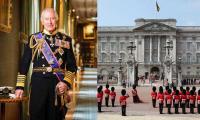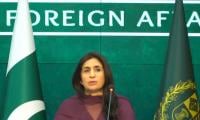Questions source of money for Dubai Mills; NAB submits record of Dar’s request for pardon; NAB, SBP and SECP asked why references not filed against Sharif family; AG asked to submit a written reply
ISLAMABAD: Hearing a set of petitions seeking a probe into the PanamaLeaks case, the Supreme Court on Monday summoned the record of offshore companies of Hussain Nawaz, the son of Prime Minister Muhammad Nawaz Sharif.
The case is being heard by a five-member bench, headed by Justice Asif Saeed Khan Khosa and comprising Justice Ejaz Afzal Khan, Justice Gulzar Ahmed, Justice Azmat Saeed Sheikh and Justice Ijazul Ahsen.
The court observed that the trail of money was yet to be disclosed by the Sharif family for establishing the Dubai Steel Mills despite the fact that the prime minister had claimed in parliament that a plethora of detailed evidence was available about his family business.
Salman Akram Raja, counsel for Hussain Nawaz and Hassan Nawaz, contended that Hussain Nawaz was the beneficial owner of the London flats and his father Nawaz Sharif had no connection with the property.
Justice Khosa observed that there was no mention where the money had come from for establishing the Gulf Steel Mills except for referring to bank loans.
Salman Akram Raja said allegations had been leveled that Hussain Nawaz was the frontman while the actual owner was his father. “It is the responsibility of those leveling allegations to provide evidence in this regard,” he contended.
Justice Ijaz, however, reminded the counsel that the prime minister had claimed in parliament that the whole record was available. “You have direct access to the flats’ record, owned by your client, Hussain Nawaz, the beneficial owner and son of the prime minister, so you are in a better position to provide the evidence,” said Justice Ijaz.
Justice Khosa, however, observed that even the prime minister had in his statement claimed to have plethora of evidence but no one was telling the court the source of money on which the Gulf Steels was established.
“Tell us the sources from where you established the Dubai Steels Mills,” Justice Ijaz asked Akram. He asked the counsel whether the Gulf Steels set up in Dubai was a gift of land. Salman Akram Raja replied that the land was taken on lease for 20 years while loans were taken from banks.
He contended that as per law, a person was innocent until proven guilty adding that the instant case was related to investigation and the matter could not be taken up under Article 184(3) of the Constitution.
He submitted that the late Mian Sharif had a number of relationships with the Gulf families as well as links with banks and he established the Gulf Steels in 1973-74 after the Ittefaq Foundries was nationalised.
After receiving loan, 75 percent shares of the mills were sold out in 1975 while 25 percents shares were sold out in 1980, he said, adding that 15 million Dirhams was received from the final proceeds paid in cash to the Qatari family.
“So you have no idea about whether the late Mian Sharif paid the liabilities of 15 million Dirhams,” asked Justice Sheikh Azmat Saeed.
The counsel replied in the affirmative adding that he also didn’t have the idea about the money trail and payment of liabilities of 15 million Dirhams by Mian Sharif.
“We are simply asking you to supply us the details of the trail of money," Justice Ijaz asked the counsel. Justice Khosa told the counsel that as per his arguments, Gulf Steels was set up on loans but he had not given any details in this regard.
Salman Akram Raja, however, contended that the court had sought the record spanning over some 45 years while Mian Sharif had bank accounts and not Hussain and Hassan Nawaz.
He said Tariq Shafi kept 12 million Dirhams on behalf of the late Mian Sharif and his two affidavits will speak out what had happened to the amount in question. The counsel also read out the two affidavits.
He told the court that after the Gulf Steels Mills was sold out, Tarqi Shafi received the overall amount in six-month installments of two million Dirhams each.
The court asked whether the amount was received in cash to which the counsel replied that he was not aware in this regard but knew that the payment was made to the Qatari family in cash.
At this, Justice Sheikh Azmat Saeed in a lighter vein questioned whether camels were used for making payments.
Earlier, during the course of hearing, Makhdoom Ali Khan, counsel for the prime minister, in pursuance of the court’s earlier order, submitted details of the properties distributed after the death of Mian Sharif in a sealed envelope. He also submitted details of the gifts exchanged by the Sharif family.
Likewise, in pursuance of the court’s another order seeking the confessional statement of Ishaq Dar in the Hudaibya Papers Mills case, the National Accountability Bureau (NAB) submitted the said record.
Waqas Qadeer Dar, Prosecutor General National Accountability Bureau (NAB), contended that on April 20, 2000 Ishaq Dar had requested the anti-graft body to pardon him, which was approved by the chairman the very next day.
He informed the court that Ishaq Dar had confessed to his involvement in the money laundering of $14.86 million on the behalf of Sharif family.
It was submitted that the investigating officer had made a request for recording the statement of Ishaq Dar, which was done before a magistrate the following day.
The court, however, noted as to why the NAB, State Bank of Pakistan (SBP) and the Securities and Exchange Commission of Pakistan (SECP) had not submitted references against the Sharif family.
The court directed the Attorney General for Pakistan to submit a written reply in this regard. Earlier, concluding his arguments, Shahid Hamid, counsel for Maryam Safdar, Captain (retd) Safdar and Ishaq Dar, submitted that a plea seeking disqualification of Ishaq Dar was submitted to the Islamabad High Court (IHC) which was later dismissed. The counsel contended that no one could be disqualified on the basis of accusations.
Saad was of the view that the battle of politics should be fought solely through political means
KP govt decided to develop gemstone business as a formal export sector and cluster at the Namak Mandi would be...
Khyber Pakhtunkhwa Minister for Higher Education, Archives, and Libraries, Meena Khan Afridi. — APP FilePESHAWAR:...
Vehicles and horse carts passing through flood water at Bara Bazar area on Khuwani bridge after heavy rain in Peshawar...
Amid the failure to revive the cash-bleeding PIA, government is left with no other option but to sell it to any...
Picture showing the Silver Jubilee Gate of the University of Karachi. — APP File KARACHI: The University of Karachi...







